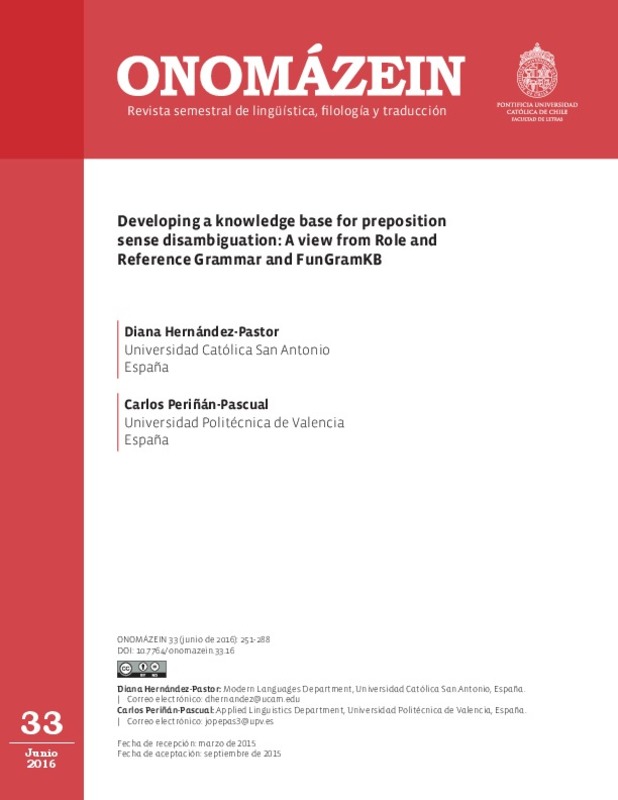JavaScript is disabled for your browser. Some features of this site may not work without it.
Buscar en RiuNet
Listar
Mi cuenta
Estadísticas
Ayuda RiuNet
Admin. UPV
Developing a knowledge base for preposition sense disambiguation: A view from Role and Reference Grammar and FunGramKB
Mostrar el registro sencillo del ítem
Ficheros en el ítem
| dc.contributor.author | Hernández-Pastor, Diana
|
es_ES |
| dc.contributor.author | Periñán Pascual, José Carlos
|
es_ES |
| dc.date.accessioned | 2017-06-07T16:35:06Z | |
| dc.date.available | 2017-06-07T16:35:06Z | |
| dc.date.issued | 2016-06 | |
| dc.identifier.issn | 0717-1285 | |
| dc.identifier.uri | http://hdl.handle.net/10251/82520 | |
| dc.description.abstract | Prepositions represent a grammatical category of frequent use in many European languages. The combination of their semantics with other lexical categories usually makes them difficult to be computationally tractable. As far as natural language processing is concerned, some studies have contributed to make progress on the usage of prepositions. However, there still exists a need to develop a model that allows tackling the problems which result from the disambiguation of prepositional semantics. The goal of this paper is to describe a lexico-conceptual model which can store the knowledge required to disambiguate predicate prepositions, as well as how this model can be exploited by a parser to extract the semantic representation of a text. The theoretical foundation of this approach, which is grounded on the premises of Role and Reference Grammar and FunGramKB, is illustrated with temporal adjuncts expressed by prepositional phrases in English. | es_ES |
| dc.description.sponsorship | Financial support for this research has been provided by the DGI, Spanish Ministry of Education and Science, grant FFI2011-29798-C02-01. Moreover, much of this work has resulted from the first author's ongoing PhD thesis "La desambiguacion semantica de los sintagmas prepositivos como adjuntos perifericos en el marco de la Gramatica del Papel y la Referencia: un enfoque desde la linguistica computacional y la ingenieria del conocimiento", to be presented in Universidad Nacional de Educacion a Distancia (UNED). | en_EN |
| dc.language | Inglés | es_ES |
| dc.publisher | Facultad de Letras - Pontificia Universidad Católica de Chile | es_ES |
| dc.relation.ispartof | Onomázein : Revista de Lingüística, Filología y Traducción | es_ES |
| dc.rights | Reconocimiento - Sin obra derivada (by-nd) | es_ES |
| dc.subject | Disambiguation | es_ES |
| dc.subject | Knowledge base | es_ES |
| dc.subject | Preposition | es_ES |
| dc.subject | FunGramKB | es_ES |
| dc.subject | Role and reference grammar | es_ES |
| dc.subject.classification | FILOLOGIA INGLESA | es_ES |
| dc.title | Developing a knowledge base for preposition sense disambiguation: A view from Role and Reference Grammar and FunGramKB | es_ES |
| dc.type | Artículo | es_ES |
| dc.identifier.doi | 10.7764/onomazein.33.16 | |
| dc.relation.projectID | info:eu-repo/grantAgreement/MICINN//FFI2011-29798-C02-01/ES/DESARROLLO DE UN SISTEMA DE REPRESENTACION SEMANTICO-CONCEPTUAL Y SU IMPLEMENTACION EN UN ALGORITMO DE ENLACE BIDIRECCIONAL SINTAXIS-SEMANTICA/ | es_ES |
| dc.rights.accessRights | Abierto | es_ES |
| dc.contributor.affiliation | Universitat Politècnica de València. Escuela Politécnica Superior de Gandia - Escola Politècnica Superior de Gandia | es_ES |
| dc.description.bibliographicCitation | Hernández-Pastor, D.; Periñán Pascual, JC. (2016). Developing a knowledge base for preposition sense disambiguation: A view from Role and Reference Grammar and FunGramKB. Onomázein : Revista de Lingüística, Filología y Traducción. 33:251-288. https://doi.org/10.7764/onomazein.33.16 | es_ES |
| dc.description.accrualMethod | S | es_ES |
| dc.relation.publisherversion | http://dx.doi.org/10.7764/onomazein.33.16 | es_ES |
| dc.description.upvformatpinicio | 251 | es_ES |
| dc.description.upvformatpfin | 288 | es_ES |
| dc.type.version | info:eu-repo/semantics/publishedVersion | es_ES |
| dc.description.volume | 33 | es_ES |
| dc.relation.senia | 327412 | es_ES |
| dc.contributor.funder | Ministerio de Ciencia e Innovación | es_ES |








